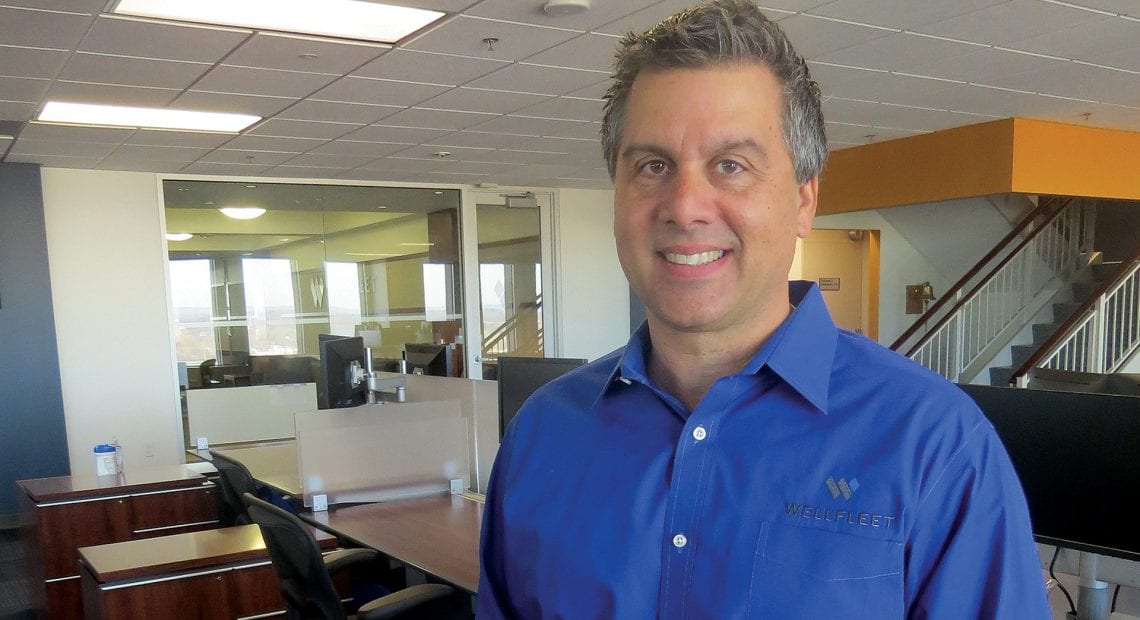Lessons Learned from COVID
It’s been said time and again that, for businesses large and small, the pandemic provided a number of learning opportunities. Companies learned new ways to do things — mostly out of necessity — while also learning that the ‘old’ way may not be the best way. Meanwhile, the pandemic provided opportunities that didn’t exist before — especially when it comes to hiring — and accelerated the pace of needed change. All that means the landscape has been altered for the long term.
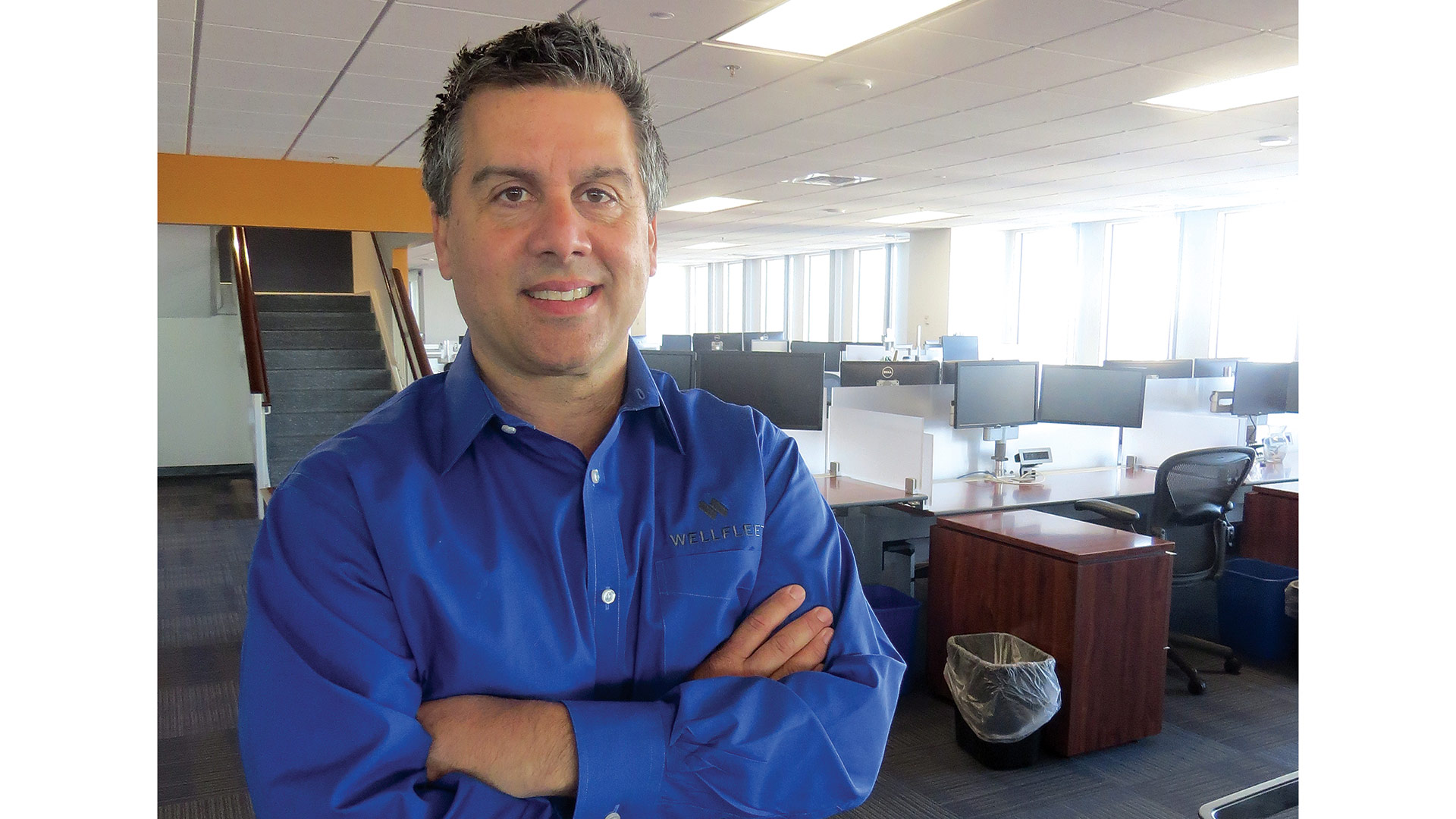
Drew DiGiorgio, president and CEO of Wellfleet, in the company’s mostly unoccupied space in Tower Square.
They’re called ‘insurance bibles.’
That’s the name those at HUB Insurance have attached to the large binders — some of them containing 700 pages or more, in the case of large commercial accounts — that tell clients everything, as in everything, about what’s in their policy, what’s covered, what isn’t, and on and on.
As he held one up, Timm Marini, president of HUB International New England LLC, noted that, prior to the COVID-19 pandemic, bibles only came in the printed variety. Now, if a client wants one — and some of them don’t — a digital file is sent, in part because a client can’t pick one up, and HUB can’t drop one off.
And, by and large, things will stay this way, said Marini, noting that COVID has shown those at the company that they don’t need to kill trees and use up expensive toner to provide a client with their insurance bible.
“Now, you can do it all electronically,” he explained. “And you probably could before COVID, but COVID made us do it more.”
This is just one of the many things companies large and small have learned during the pandemic, lessons that will carry over to the time when COVID is referred to in the past tense. Others involve everything from not having to scan documents for tax preparers to not necessarily limiting a candidate search to those living in the 413, to not having people travel to a conference on the other side of the state if they can instead take it in via Zoom.
“It’s a mix, but many certainly want to come back. They’re lonely … they actually want to work in more of a community setting.”
In a word, the pandemic has shown area businesses and nonprofits that they have more options than maybe they thought they had, when it comes to how and where people work and just how things are done.
For this issue and its focus on the modern office, we talked with a number of business owners and managers about what’s been learned over the past 12 months or so and how COVID has actually made companies more efficient and enabled them to reduce costs in some areas. The observations were telling.
“The audit side of our practice generally required teams of people here to go visit on site at other locations,” said Sarah Rose Stack, Marketing & Recruitment manager at the Holyoke-based CPA firm Meyers Brothers Kalicka. “Because of COVID, we learned we could do these remotely, which is something we’ve never done; this was a first-time experience not just for us, but for people in our industry. We’ve learned that it’s fine, it is efficient, and with some businesses, we’ll keep doing it this way moving forward.”
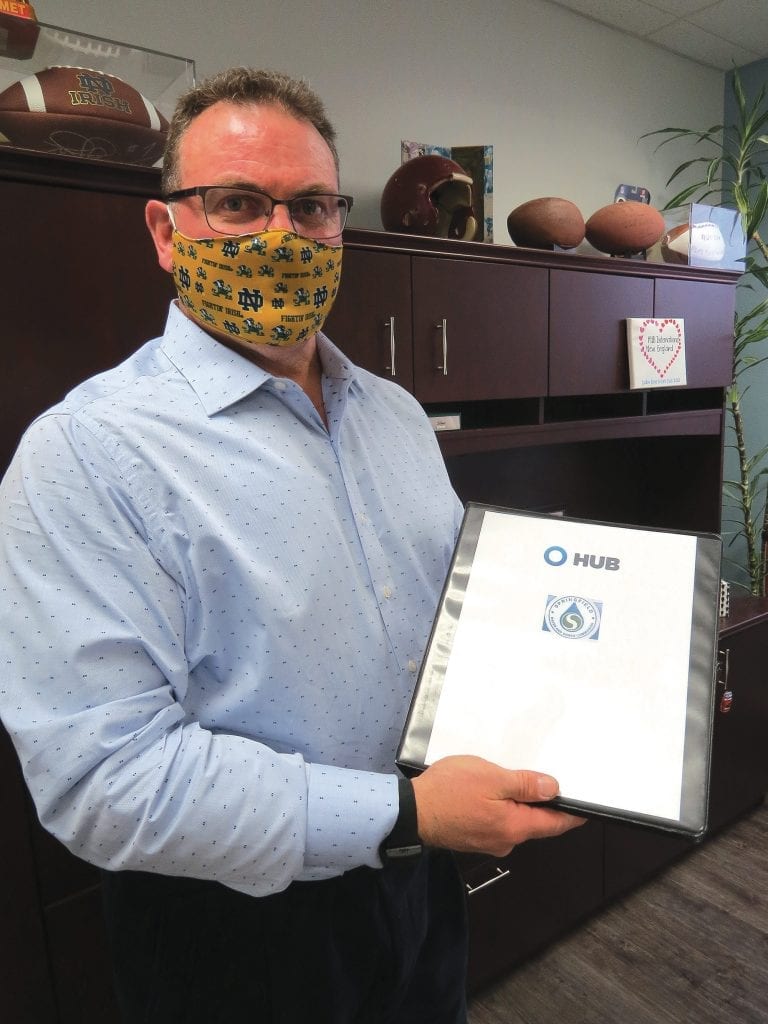
Timm Marini holds up an ‘insurance bible’ — the printed variety. Those at HUB have had to send digital documents during the pandemic, and that trend will continue into the future.
For Springfield-based Wellfleet, now with offices in Tower Square, the pandemic has provided ample evidence that employees in many positions can work effectively and remotely, and this enables the company to expand its horizons when it comes to hiring.
“You can expand your pool when it comes to workforce; we can hire someone not from the Springfield area and have them be successful with the tools that we’ve developed,” said Drew DiGiorgio, the company’s CEO, adding that the company has already hired some people from other parts of the country. Meanwhile, it is working on plans to have other employees work a hybrid schedule, with some days in the office and others remotely.
Chuck Leach, president and CEO of Lee Bank, said that, prior to COVID, HR Director Susie Brown and IT Director Drew Weibel were already hard on work on plans to position the bank to be more flexible with its workforce in terms of where and how it worked. The pandemic served to accelerate that process.
“Even though we’re Lee Bank, a lot of our employees come in from other markets,” he noted, adding that these lengthy commutes prompted talk and then creation of plans for remote work and hybrid schedules. “We were already thinking about it, and COVID forced us to be more deliberate in our approach and our policies and procedures.”
But even with these options in place and far more flexibility with work schedules than ever before, the bank is tilting strongly toward having people work on site — with some exceptions — and it’s also seeing most of its employees want to come back, which is another thing companies are learning as they work their way through COVID.
“It’s a mix, but many certainly want to come back,” Weibel said. “They’re lonely … they actually want to work in more of a community setting. They want to come back, but some find it easier to work at home until the school situation is worked out and their children are back in the classroom.”
Stack agreed. “When the shutdown first happened, everyone was excited to work from home, so a lot of people exercised that option, and some people have found they’re more efficient from home, cutting out that commute,” she said. “But while some still work from home, the majority of people, like 97% of the people at MBK, choose to come into the office every day because they don’t want to work from home.”
Work in Progress
DiGiorgio said it’s somewhat frustrating to walk around his company’s offices in Tower Square.
More than 200 employees moved into the well-appointed space covering three full floors in the late summer of 2019, only to see pretty much everyone pack up and go home to work in mid-March.
“We love it — we wish we could be in it more,” he said with a laugh. “It’s great space — open-floor design, all the things you probably don’t want with COVID. It will be great to get back to it.”
Indeed, that’s a lot of fairly expensive (for this market) downtown Springfield real estate that is not being used. But DiGiorgio doesn’t dwell on matters that are out of his control.
Instead, he’s more focused on what the future will look like — and applying all the lessons learned during the pandemic.
As for that real estate … he said this is a growing company that took three floors with the intention of perhaps soon absorbing a fourth. Need for that additional space is less likely now, he acknowledged, but the company will still need the space it’s now leasing because he fully expects most of his employees to be back in that space.
But not all will have to come back, he went on, and some, as he noted, will never have to sit at a desk there.
“We have, over the past year, hired people in Florida, Tennessee, Atlanta, Minneapolis, Upstate New York … we have a pretty remote workforce,” he said, adding that some of these hires took place before COVID because the tools were in place, but the pandemic has highlighted how effective people can be working remotely, and thus, as he said, broadened and deepened the talent pool.
“We have a billing person who’s in Tennessee. I feel more comfortable now that she can hire people in Tennessee or wherever she needs to; they may not need to be in Springfield, which is what our initial thought was. COVID has opened up our thinking to where we hire people.”
Marini agreed. “We have employees in Wisconsin who work for New England,” he explained. “We have people who decided to move to Florida and still work for New England. We had a little of that before COVID, but what we realized was that, with our ability to get our automation up and running, our digital offerings, that really expanded our talent pool; there have been some relocations during COVID and some new hires during COVID that are not Western Mass.-based. And we have some people in Western Mass. who work for some of our Eastern Mass. locations and even one in New York.”
COVID has reinforced this premise, as it has many others, while accelerating some trends and pretty much forcing companies to do some things they never considered before.
Like those virtual audits at Meyers Brothers Kalicka.
Stack said the firm’s teams have undertaken a number of them, while, in other cases, it has adopted a hybrid approach for some audits, going to the client site for some of the work while handing the rest remotely. Thanks in large part to COVID, there are now several options for handling such work, she said, adding that other lessons have been learned and other new ways of doing things revealed.
“On the tax side of our practice, we used to have clients in the building all day, every day, from February 1 through tax day, and now, maybe three people a day drop off their boxes of papers; the vast majority of people just e-mail us their material,” she explained. “They’re happy with it, it’s efficient, and it saves us a step. Instead of having to take tons and tons of paperwork and scan it into our digital system, it’s already coming to us in that format.
“We used to have to hire a scanner for tax season — a whole person whose job was to take all this paper that people would drop off and scan it,” she went on. “We didn’t have to hire a scanner this season, and that was definitely a positive change.”
Will Dávila, executive director and CEO of the Children’s Study Home in Springfield, said the pandemic has led to positive change in many forms at his agency and most all businesses and nonprofits. He echoed others when he said that COVID has served to heighten the awareness of how technology can be used to improve efficiency and save time, such as when traveling to conferences or meetings in other cities.
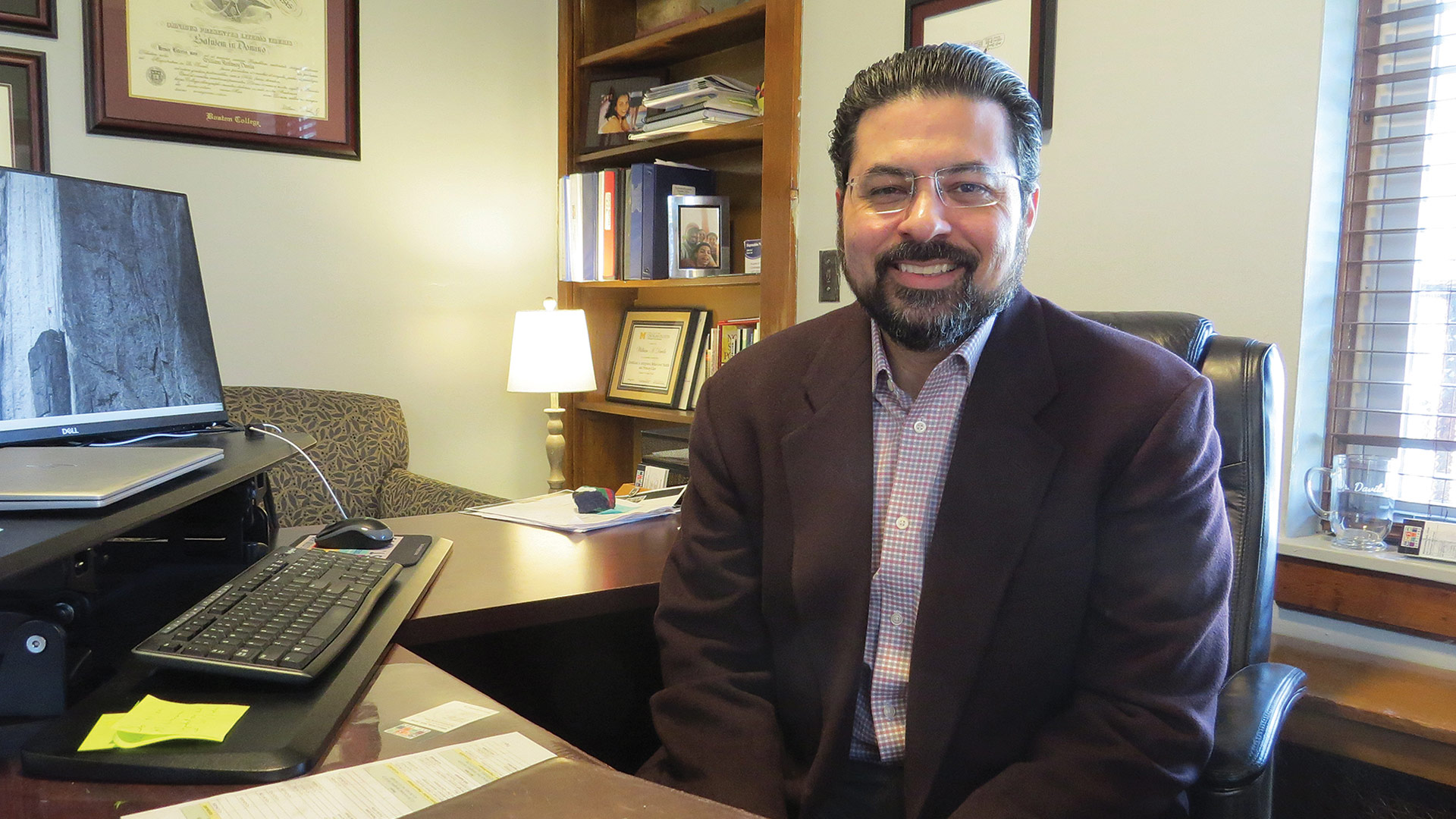
Will Dávila, executive director of the Children’s Study Home, says his agency has learned a number of lessons during the pandemic, many of them involving better use of technology.
“We now have more of a comfort level with working remotely and working via Zoom,” he said, adding that this technology existed long before COVID, but few businesses took full advantage of it. “The lesson for us, and I’m not sure we have it completely figured out yet — it will likely take us some time — is that we can do more with technology than we thought we could before. I’ve been in places where we would talk about technology and teleconferencing and telehealth, and people would balk at it. And now, we’ve been forced to take another look, and we’ve embraced it.”
Looking ahead, he said that, while most people look forward to the day when they can gather and attend conferences and meetings in person, they know there are options — there’s that word again — and they won’t be hesitant to take full advantage of them if the circumstances permit.
Caution Signs
As he walked with BusinessWest through HUB’s headquarters facility on Shaker Road in East Longmeadow, Marini pointed to a number of unoccupied workstations, some of them marked off with the yellow ‘caution’ tape usually associated with crime scenes and construction sites. Such tape can be seen throughout the suite of offices, he said, noting that the space — which was occupied by just over 50 employees prior to the pandemic — has hosted around seven a day on average, with a high of 14, by his count.
Sectioning off such areas became part of life during COVID, he noted, adding that there are myriad ways the pandemic changed the landscape for the company. Overall, there’s been a huge shift; a place once teeming with employees and visiting customers now sees very few of either.
And that has brought challenges — and some opportunities, mostly in the form of learning how to do things remotely and without reams of paper. As he talked about these opportunities, Marini gave a nod — sort of, anyway — to an organization his business works closely with, obviously: the Registry of Motor Vehicles.
“Even the Registry of Motor Vehicles here in the Commonwealth of Massachusetts has become more digitized, more automated, and more flexible, and that’s something I never thought I’d see after 33 or 34 years of doing this,” he told BusinessWest, adding that, in some ways, his company has been inspired by the RMV, as it automates and digitizes many processes that once involved paper and in-person sessions.
As for the challenges, they came in waves, Marini explained, from equipping everyone to work at home, which was expensive and difficult logistically, to helping employees cope with everything from feelings of isolation to simply filling their days with work, even though they were home.
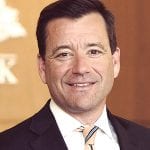
Chuck Leach
“Even though we’re Lee Bank, a lot of our employees come in from other markets. We were already thinking about it, and COVID forced us to be more deliberate in our approach and our policies and procedures.”
“We were too accessible when we were home, so there were no breaks for our people,” he explained. “We started having big conversations and hiring professionals to come in to coach us to make sure we took breaks and that there was separation between home and work.”
What will things look like several months from now, especially if the pandemic continues to ease? Marini isn’t exactly sure, but he acknowledged that he spends a lot of time thinking about it and working with corporate to prepare for that day.
He does know that more business will be handled virtually in the future, and there will be little, if any, need for those printed insurance bibles.
As for employees, like others we spoke with, he expected that they will come back, because the company wants them back, but also because they want to be back in that office setting.
Such sentiments were echoed by many of those we spoke with. They noted that it seem logical that, after getting a taste of working at home, many employees would prefer that option, but what employers are generally seeing is the opposite reaction.
“People are sick of remote everything,” said Stack, noting that Meyers Brothers Kalicka has a younger team within the audit department that could do its work from home, but instead it has reserved the firm’s huge boardroom for the past six weeks so the members can work together, but safely and well spread out.
“They have music playing on Spotify every time you walk in there,” she said. “They just want to be in the same space — they think they’re more efficient that way, and they can ask questions of each other faster and stay on track better because they’re all together. It’s not something we told them they had to do; they’ve chosen to do it.”
Dávila agreed, although he noted that he has some employees who are quite happy working at home, and are “working on it” when it comes to returning to the office. By that, he meant he’s offering some flexibility on this matter and not rushing anyone back who doesn’t want to rush back.
“I think it’s partly generational — people who have been in the field for 15 or 20 years or more and are used to those in-person interactions, they’re used to having that time by the water cooler when they’re getting a cup of coffee. I consider those valuable interactions that help with morale,” he told BusinessWest. “But we also have younger staff who are very comfortable with technology and embrace the idea of working remotely.”
But, ultimately, they will come back, probably by the end of the calendar year. “I don’t want to say absolutely not,” he said when asked about hybrid arrangements that offer a mix of remote and in-office work. “But my preference is that we get people back to a schedule where they can see each other and interact.”
Lee Bank’s Susie Brown agreed. “When it comes to Lee Bank, I think everyone enjoys being together,” she said. “We don’t have a lot of people who are unwilling to come back; those that are unwilling are those that have other challenges at home with their children.”
Bottom Line
COVID is far from over, and there are certainly more lessons to be learned as companies large and small continue to cope with an unprecedented challenge.
But it’s already evident that this battle has prompted changes that will live on long after the pandemic is in the rear-view mirror. As they were forced to do things differently, companies learned that, in many cases, these different ways are better than the old ways.
Like the insurance bible. Clients, at least some of them, will still need one. But they won’t need to thumb through 700 pages of printed material to find an answer.
COVID has changed all that — and it keeps on changing the landscape.
George O’Brien can be reached at [email protected]



